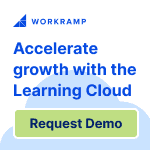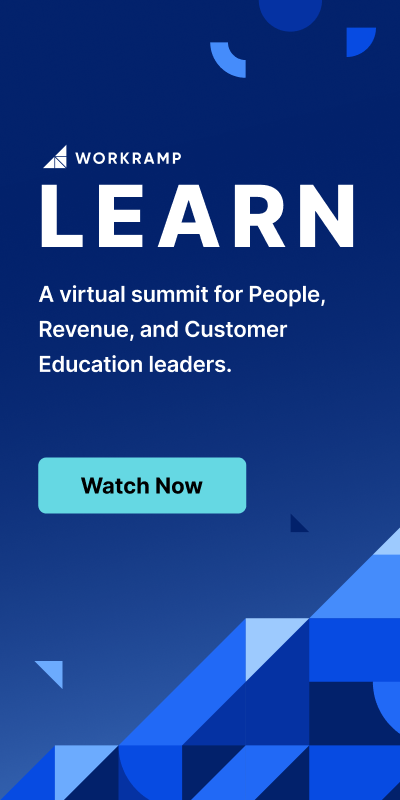10 Best Healthcare LMS Systems & Software
Elise Dopson | WorkRamp Contributor
View bioLearning Tips Straight to Your Inbox
A learning management system (LMS) is the foundation for your learning and development programs.
Healthcare organizations, in particular, have a plethora of topics to cover. Nurses need ongoing medical skills training; receptionists must know how to protect patient data; all teammates must be compliant with data protection regulations.
Because of this, there’s a laundry list of things to check before implementing any new software into your healthcare organization. Is the tool HIPAA compliant? Does it offer features to educate patients alongside employees? Will it scale as your patient base grows?
To help you on your search, this guide shares 10 of the best healthcare LMSes, complete with must-have features and use cases to get the most value out of your new system.
In this post:
What is a healthcare LMS?
A healthcare learning management system (LMS) is a platform that healthcare organizations use to manage, deliver, and track the effectiveness of training materials. It acts as the virtual home for:
- Employee onboarding programs
- Compliance training
- Medical skills training
- Role-playing and simulations, such as patient consultations or diagnoses
Healthcare LMSes also help you efficiently organize and track learning content. It helps you answer questions like “How well are students retaining the knowledge we’re providing?”, “Where are our current skills gaps?”, and “Are our medical staff up-to-date with compliance?”. These answers would be difficult—or downright impossible—to find if you’re using a shared company drive to house learning materials.
Best healthcare LMS
Looking to implement a healthcare LMS in your organization? Here’s a complete rundown of the best options ranked by their features, pros, cons, and user reviews.
- WorkRamp
- Healthstream
- Cornerstone
- Litmos
- Docebo
- Maple LMS
- LearnUpon
- TalentLMS
- Tovuti
- Absorb LMS
1. WorkRamp
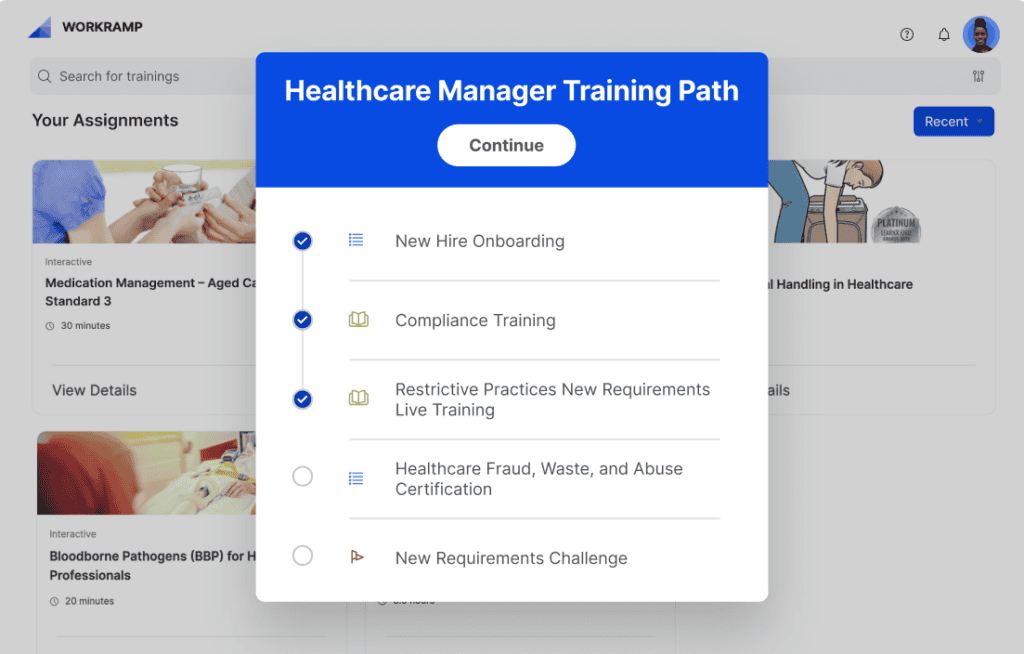
WorkRamp is an all-in-one LMS that can handle patient, employee, and partner training programs within a single interface. It’s trusted by innovative brands like Reddit, Loom, and Workiva.
WorkRamp offers a completely customizable online training academy to showcase and organize your healthcare training content—hence why it’s the healthcare LMS of choice for organizations like Blink Device Company.
In an attempt to revamp its PowerPoint training sessions and create a more engaging learner experience, Blink Device Company turned to WorkRamp to build resource libraries with various interactive content formats inside a customizable online academy.
Since implementing WorkRamp’s healthcare LMS, the Blink Device Company has:
- Saved 1,000+ hours of in-person training
- Certified over 550 anesthesia clinicians
- Implemented 10 new academic health systems
“Leaning into customer education with WorkRamp has been an absolute game-changer,” says Tenaje Calloway, Manager Clinical Implementations at Blink Device Company.
“Our device, TwitchView, has a unique clinical focus, and implementing it comes with practice and workflow changes, so offering educational resources allows us to support clinicians with successful implementation, ongoing utilization, and refreshers for our early adopters.”
Key features:
- AI Assist, a generative AI tool that can create training materials, repurpose or translate existing content, and change the tone of learning content
- Content marketplace with prebuilt materials to speed up the content creation process
- Personalized learning paths tailored to a learner’s job title, experience, or skills level
- Mobile app to encourage microlearning amongst healthcare students
- Community features to encourage learner participation and engagement
- Advanced reporting to track learner performance, content effectiveness, and LMS ROI
- Enterprise-grade security: WorkRamp is SOC 2 Type 2 certified, GDPR and CCPA compliant
- Integrates with tools like Zapier, Microsoft 365, Slack, Zoom, and BambooHR
- Rated 4.4 out of 5 stars on G2
Take a free demo of WorkRamp to see how the healthcare LMS can help you onboard employees, train and retain talent, and mitigate corporate risk.
2. Healthstream
Healthstream’s LMS solution is specifically designed for healthcare organizations. Also referred to as hStream, partners include the American Red Cross, American Nurses Association (ANA), and Sigma.
Key features include:
- Automated learning assignments and paths
- Jane AI—a proprietary AI-powered assistant that can measure clinical judgment
- Classroom management to record attendance and deliver virtual instructor-led training
- Customizable LMS reporting dashboard
- User permissions to control how people use the healthcare LMS
Pricing: Healthstream doesn’t share its pricing plans publicly. You’ll need to contact its sales team for a personalized quote.
3. Cornerstone
Cornerstone’s LMS isn’t purpose-built for healthcare providers, but it has a range of features that make it easy to deliver medical learning and development programs. It offers prebuilt training content, flexible reporting, and customization features.
Key features:
- Content workflows to optimize the learning experience
- Support for interactive content
- Personalized learning paths
- AI-powered content curation to reference when writing new training materials
- Streamlined setup process with easy LMS implementation
Pricing: Cornerstone doesn’t share the price for its healthcare LMS publicly.
4. Litmos
Litmos’ healthcare LMS offers a variety of integrations with popular business tools. It also promises quick and simple deployment, with the ability to customize the LMS interface to add your healthcare business’ branding.
Key features:
- Content authoring tools to customize the delivery of content
- AI assistant to complete basic administrative tasks
- Granular content control depending on user permissions
- Integrates with Salesforce, Microsoft Teams, and Workday
- Mobile app to encourage learning on-the-go
Pricing: Litmos has three pricing tiers to choose from depending on your business needs, but the cost of these isn’t shared publicly. There is a 14-day free trial available.
5. Docebo
Docebo’s healthcare LMS is designed for larger-scale companies. It’s capable of handling multiple training programs—not just for employees, but for patients and partners too.
Key features:
- Native screen recording functionality
- In-app learner feedback surveys
- Hyper-personalized training recommendations unique to each learner
- Integrates with apps like Slack, Asana, Zendesk, Gmail, and Salesforce
- Content marketplace to browse prebuilt learning materials
Pricing: Docebo’s Engage plan includes gamification, localization, and white labeling features, but pricing isn’t shared publicly.
6. Maple LMS
Maple has a range of educational platforms under its belt—including an LMS that can be used “anywhere, anytime, on any device”. It offers unique features like cheat-proof exams and remote proctoring which are ideal for compliance and certification.
Key features:
- Online exams to judge knowledge retention
- Pre-employment assessment and certification features
- Content authoring that supports multimedia formats
- Ability to white-label the healthcare LMS with your branding
- Over 50 preconfigured reporting templates and real-time analytics
Pricing: Pricing for Maple LMS isn’t shared online, but it offers a free trial with no credit card required.
7. LearnUpon
Looking for a healthcare LMS provider that integrates with Salesforce, is mobile-friendly, and incorporates native AI functionality? LearnUpon fits the bill. It’s a good choice for smaller healthcare organizations that want an intuitive student interface.
Key features:
- Salesforce integration
- Adaptive learning functionality to change learning content based on student progress
- Interactive leaderboards to ignite friendly competition
- Smart search functionality in a self-serve training hub
- Assessment and certification engine for ongoing compliance training
Pricing: LearnUpon has an “Essential” plan that includes up to 150 users. However, it doesn’t share its pricing publicly—you’ll need to contact its team for a custom quote.
8. TalentLMS
If you’re not familiar with an LMS interface, TalentLMS is worth exploring. The cloud-based LMS is designed to be as easy to use as possible, complete with interactive features like tests, quizzes, and surveys to engage learners.
Key features:
- Native content translation
- Generative AI to create new healthcare training content from a prompt
- Support for webinars and live training sessions
- Tests, quizzes, and feedback surveys
- Advanced search and categorization to make training materials easy to locate
Pricing: Free plan available for up to five users and 10 courses. Paid subscriptions start at $89 per month when billed annually.
9. Tovuti
Add Tovuti to your healthcare LMS shortlist if you’re searching for a platform that makes it incredibly easy to produce training content. The system offers an intuitive course builder with social learning functionality.
Key features:
- Blended and social learning
- Option to customize the online academy with your branding
- Automated alerts and notifications to encourage learner participation
- Integrations with 2,000+ apps through Zapier
- Searchable audit trail for compliance
Pricing: Tovuti doesn’t share its LMS pricing publicly. You’ll need to contact its sales team for a custom quote.
10. Absorb LMS
Absorb has two product offerings: Infuse, a learning experience platform, and Create, which is positioned as an online course builder. The former is best suited to healthcare organizations that want to personalize and improve the student experience.
Key features:
- Personalized upskilling with tailored learning paths
- Customizable customer education academy to train patients
- Course sales functionality to monetize your training materials
- Customizable reporting dashboards
- In-app social platforms to build a sense of community
Pricing: Plans are personalized, but you can use Absorb’s online quote builder to get a price for your organization.
Benefits of using LMS platforms in healthcare
Shared company drives aren’t sophisticated enough to handle healthcare L&D programs. Here are the benefits that a designated medical LMS has to offer.
Improve staff onboarding and training
There’s a lot that new employees must get up to speed with when they start working at your company—whether that’s your code of conduct, compliance training programs, or job-specific lessons that teach them your way of working.
A healthcare LMS helps with the employee onboarding process by creating an introduction course that new hires are automatically enrolled in when they join the company. This helps you save time on manually creating training materials and inviting every new learner to enroll. It’s all done automatically.
Upskill and retain top employees
It’s estimated to cost between six to nine months of an employee’s salary to replace them. This can be significantly higher if you’re recruiting for a specialist role. (For context: the average annual salary of a surgeon is over $282,000 per year.)
Poor learning and development opportunities could cause this issue within your organization. Studies have shown that 94 percent of employees will stay at a company longer if their employer invests in their careers.
Your healthcare LMS not only shows a commitment to growth and progression but also offers personalized learning experiences that help employees upskill and make headway on their professional goals.
Identify areas of clinical knowledge gaps
The medical industry is constantly changing. Best practices for diagnoses aren’t the same as they were 10 years ago. The skills your team needs to offer patient care aren’t either, which presents the need for regular training.
Increased demand, rapid turnover, or outdated training materials can cause a skills gap. The best healthcare LMSes highlight these gaps in your workforce’s current clinical expertise, so you can update and reoptimize content to meet their learning objectives and build a well-rounded team.
This doesn’t have to be medical skills training—Statista reports that creative thinking, curiosity, leadership, and top reskill focuses in the medical and healthcare service. Incorporate soft skills training into your L&D programs to build these habits and address soft skills gaps in your workforce.
Drive better health outcomes
The best healthcare LMSes don’t just let you train employees—they also let you create patient education programs on the same platform used to train your team.
A clinician, for example, might give patients a short demonstration on how to administer a subcutaneous injection at home. These instructions are very specific but easy to forget when delivered in person, so the clinician points the patient toward a tutorial video inside your healthcare LMS on how to administer the medication at home.
This alleviates pressure on your nursing team and receptionists—patients can reference the video at home, in their own time, without needing to contact you for support. This ultimately improves the patient experience and reduces the risk of them administering the wrong medication or using a technique that ultimately causes more harm.
3 Reasons You’re Ready for Customer Education
Meet healthcare compliance
Healthcare is a heavily regulated industry. There are specific rules on how to handle patient data and deliver their care. That’s alongside generic business regulations and legal obligations, like training your team on cybersecurity risks and health and safety.
Healthcare LMSes that offer support for compliance training make this process easier. You’ll get reminders when each student’s compliance must be renewed, as well as certifications to prove they’re up to date.
Top features to look for in healthcare learning management systems
Before committing to a new healthcare LMS, check that it offers these important features to make sure it’s the right one for your organization.
HR integrations
Learning and development get increasingly difficult to manage when your workforce grows. Integrations with your human resources (HR) platform streamline the process by automatically creating user profiles and enrolling them into job-specific training, without any intervention required on your behalf.
WorkRamp’s integration with BambooHR, for example, can create new user profiles inside your healthcare LMS and sync custom attributes—such as their job title or experience level—to personalize the learning experience and spend less time on admin. Should they be promoted or leave the company, their WorkRamp learner profile is automatically adjusted.
On-demand personalized learning paths
It’s not uncommon for healthcare organizations to employ people in hundreds of different roles. Each one requires unique learning materials. The appointment scheduling tutorial created for receptionists won’t be of use to therapists, for example.
Choose a healthcare LMS that supports personalized learning paths based on a learner’s job title, experience, skills level, or training history.
For example, a receptionist who’s already undertaken your “How to use Electronic Health Records (EHR system)” training video might not need to retake the course every year. You could point them toward a microlearning-style refresher module to cement the essential points or create a self-serve documentation library for them to reference when they have a specific question about the EHR system.
Healthcare-compliant training modules
A healthcare LMS helps you improve patient care because your staff is always up to date with compliance training, knowledge, and technologies. Certifications prove this in case of an audit—you’ll have evidence that your team is up to date with best practices and regulatory requirements.
Some LMSes have pre-built, interactive compliance training courses to save time with this aspect of healthcare training. You can also configure alerts to flag managers when team members are out of compliance.
WorkRamp, for example, recently partnered with Ethena to offer prebuilt courses on compliance training topics like:
- Code of conduct
- Harassment prevention
- Data privacy
- HIPAA compliance
The best part: Athena compliance training courses average a 95 percent positivity rating across more than 1.2 million learners. You’ll not only get a solid foundation of compliance training programs that are means-tested and up-to-date, but also enjoyable for learners to participate in.
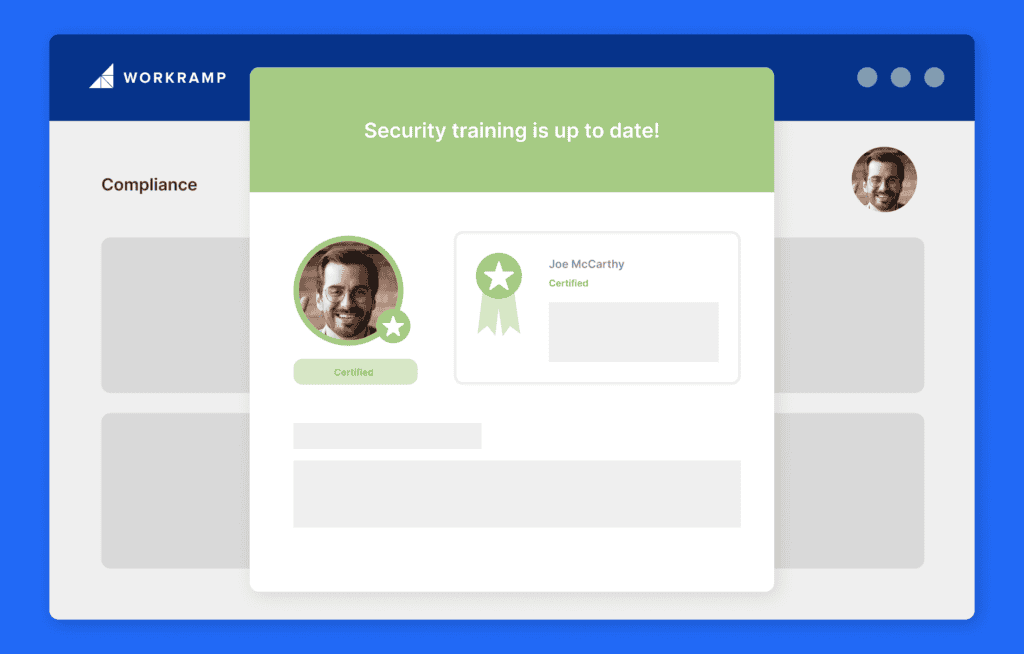
Interactive content formats
Let’s face it: topics like patient data protection aren’t the most exciting things to learn about. And while interactive content formats don’t change the education you’re providing, they can significantly improve the learning experience.
Studies have shown that up to 72 percent of employees don’t give their full attention to static content. Some 82 percent say that interactive content is more effective at maintaining their concentration. Only then can you expect students to absorb the knowledge you’re sharing.
Examples of interactive content to use in healthcare training include:
- Polls or quizzes
- Feedback surveys
- Role-playing, which lets you train staff on specific medical situations in a safe and controlled environment—without risking patient health
WorkRamp can help you create interactive quizzes that test knowledge retention. Your midwifery team, for example, could receive a series of questions related to antenatal care after taking your online course. Any incorrect answers are flagged.
The added advantage of this functionality is that it flags potential content gaps in your training. You’re probably missing something or could deliver a specific point differently, if multiple learners repeatedly get the same question wrong.
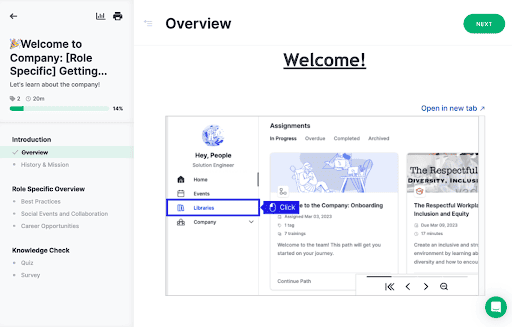
Enterprise-grade security
Sometimes the best way to train healthcare employees is to replicate the situations they’ll find themselves in. These training materials better prepare them for the world of work—they’ll know how to handle the situation because they’ve already practiced it in a safe and controlled environment.
But to do this, you might need to upload sensitive data—such as patient medical history—to your healthcare LMS. You have a legal obligation to keep this data safe under HIPAA law.
Check that your healthcare LMS provider offers enterprise-grade security. WorkRamp, for example, features 256-bit encryption, and secure SSO & SOC 2 Type 2 compliance. It’s also GDPR compliant to protect the confidential information associated with learners in the EU and offers two-factor authentication and audit trails for extra security.
On-the-go learning
Employees might be resistant to undertake your healthcare training courses if they’re too time-consuming. Doctors, for example, likely have long and stressful days. The thought of signing onto their computer and watching an hour-long video can deter them from taking the course.
Microlearning is an L&D approach that offers bite-sized content—smaller versions of longer courses that let them learn on the go. This functionality, complete with a mobile app, can build a stronger culture of learning. There are fewer hurdles in the way for healthcare employees to learn.
Learning progress tracking
Do you know how effective your training materials are at meeting their learning objectives? What new skills did students learn? And how has their training impacted business targets? A healthcare LMS with native reporting features helps you with this aspect of learning progress tracking.
But don’t just look at LMS analytics in isolation—the best healthcare LMSes can integrate with other analytics tools to see the bigger picture. For example, you could use WorkRamp’s Salesforce integration to measure the impact of sales training on medical sales performance, or the Quantum Metric connector to identify regular customers and invite them to join patient advocacy programs.
Decisions Start with Data #data #analytics #remotework
The best care begins with the best healthcare LMS
Now that you have a shortlist of healthcare LMSes to choose from, it’s time to start evaluating your options.
Don’t just look at what you need right now—migrating from one LMS to another is a time-intensive and costly process. Look at the bigger picture and the features you’ll need as your organization grows. Make the right choice the first time and you’ll never have to worry about searching for another healthcare LMS provider again.
Request a free demo of WorkRamp today to see how the healthcare LMS can help you manage compliance, identify clinical knowledge gaps, and retain top talent.
Complete the form for a custom demo.
Recent Posts
- Top LMS Integrations That Power Smarter, Faster Learning July 2, 2025
- Introducing WorkRamp Analytics Studio: Unlocking Your Data Insights with AI June 30, 2025
- 11 AI LMS for AI-Powered Learning June 27, 2025
- The Best LMS Platforms for Customer Retention (2025 Guide) June 27, 2025
- 11 Best AI Learning Platforms June 16, 2025
Elise Dopson
WorkRamp ContributorElise Dopson is a freelance writer for B2B SaaS companies. She’s also the co-founder of Peak Freelance and mom to an adorable Spaniel pup.
You might also like
Top LMS Integrations That Power Smarter Training
An LMS is only as powerful as the tools it connects with. To maximize your LMS, it should integrate seamlessly with the tools your team already uses, like your CRM, HRIS, or communication apps. The right integrations reduce manual work, personalize learning, and help tie training directly to business outcomes. In this guide, we’ll walk […]
Read More
WorkRamp launches Analytics Studio for AI-powered reporting and visualizations
At WorkRamp, we believe that learning should be measurable and deeply aligned with business goals so you can show your impact. That’s why we’re thrilled to launch our new Analytics Studio, a robust, AI-driven reporting engine now available across the WorkRamp platform for employee and customer learning. The days of exporting static reports and manually […]
Read More
Explore the top AI LMS platforms for advanced AI-powered learning. Enhance education with smart, adaptive technology solutions.
Explore the top AI LMS platforms for advanced AI-powered learning. Enhance education with smart, adaptive technology solutions.
Read More
The Top 3 LMS Platforms for Customer Retention in 2025
Looking to turn new customers into loyal advocates? The right Learning Management System (LMS) can help you do just that by boosting satisfaction, reducing churn, and even driving revenue growth. Here’s why it matters: keeping customers is 5–7 times cheaper than acquiring new ones, and just a 5% increase in retention can lead to a […]
Read More
Discover the Best AI Learning Platforms
Unlock the future of tech with our review of the best AI learning platforms in 2024. Dive into cutting-edge AI-powered learning today.
Read More
Top AI LMS Features Transforming Training in 2025
AI in Learning Management Systems (LMS) isn’t just a buzzword—it’s transforming how companies deliver, manage, and optimize employee training. The best AI LMS features include: Personalized learning paths Automated content creation and updates Real-time analytics and dashboards Skills gap analysis Multilingual localization Adaptive assessments and simulations Together, these features help teams train more efficiently, improve […]
Read More

